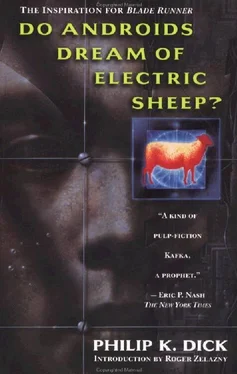“Why out of the question?” He was puzzled; everything about her puzzled him. Maybe, he thought, I’ve been living here alone too long. I’ve become strange. They say chickenheads are like that. The thought made him feel even more glum. “I could help you unpack,” he ventured; the door, now, had virtually shut in his face. “And your furniture.”
The girl said, “I have no furniture. All these things”—she indicated the room behind her—”they were here.”
“They won’t do,” Isidore said. He could tell that at a glance. The chairs, the carpet, the tables—all had rotted away; they sagged in mutual ruin, victims of the despotic force of time. And of abandonment. No one had lived in this apartment for years; the ruin had become almost complete. He couldn’t imagine how she figured on living in such surroundings. “Listen,” he said earnestly. “If we go all over the building looking we can probably find you things that aren’t so tattered. A lamp from one apartment, a table from another.”
“I’ll do it,” the girl said. “Myself, thanks.”
“You’d go into those apartments alone? ” He could not believe it.
“Why not?” Again she shuddered nervously, grimacing in awareness of saying something wrong.
Isidore said, “I’ve tried it. Once. After that I just come home and go in my own place and I don’t think about the rest. The apartments in which no one lives—hundreds of them and all full of the possessions people had, like family photographs and clothes. Those that died couldn’t take anything and those who emigrated didn’t want to. This building, except for my apartment, is completely kipple-ized.”
“Kipple-ized’?” She did not comprehend.
“Kipple is useless objects, like junk mail or match folders after you use the last match or gum wrappers or yesterday’s homeopape. When nobody’s around, kipple reproduces itself. For instance, if you go to bed leaving any kipple around your apartment, when you wake up the next morning there’s twice as much of it. It always gets more and more.”
“I see.” The girl regarded him uncertainly, not knowing whether to believe him. Not sure if he meant it seriously.
“There’s the First Law of Kipple,” he said. “‘Kipple drives out nonkipple.’ Like Gresham’s law about bad money. And in these apartments there’s been nobody there to fight the kipple.”
“So it has taken over completely,” the girl finished. She nodded. “Now I understand.”
“Your place, here,” he said, “this apartment you’ve picked—it’s too kipple-ized to live in. We can roll the kipple-factor back; we can do like I said, raid the other apts. But—” He broke off.
“But what?”
Isidore said, “We can’t win.”
“Why not? The girl stepped into the hall, closing the door behind her; arms folded self-consciously before her small high breasts she faced him, eager to understand. Or so it appeared to him, anyhow. She was at least listening.
“No one can win against kipple,” he said, “except temporarily and maybe in one spot, like in my apartment I’ve sort of created a stasis between the pressure of kipple and nonkipple, for the time being. But eventually I’ll die or go away, and then the kipple will again take over. It’s a universal principle operating throughout the universe; the entire universe is moving toward a final state of total, absolute kippleization.” He added, “Except of course for the upward climb of Wilbur Mercer.”
The girl eyed him. “I don’t see any relation.”
“That’s what Mercerism is all about.” Again he found himself puzzled. “Don’t you participate in fusion? Don’t you own an empathy box?”
After a pause the girl said carefully, “I didn’t bring mine with me. I assumed I’d find one here.”
“But an empathy box,” he said, stammering in his excitement, “is the most personal possession you have! It’s an extension of your body; it’s the way you touch other humans, it’s the way you stop being alone. But you know that. Everybody knows that. Mercer even lets people like me—” He broke off. But too late; he had already told her and he could see by her face, by the flicker of sudden aversion, that she knew. “I almost passed the IQ test,” he said in a low, shaky voice. “I’m not very special, only moderately; not like some you see. But that’s what Mercer doesn’t care about.”
“As far as I’m concerned,” the girl said, “you can count that as a major objection to Mercerism.” Her voice was clean and neutral; she intended only to state a fact, he realized. The fact of her attitude toward chickenheads.
“I guess I’ll go back upstairs,” he said, and started away from her, his cube of margarine clutched; it had become plastic and damp from the squeeze of his hand.
The girl watched him go, still with the neutral expression on her face. And then she called, “Wait.”
Turning, he said, “Why?”
“I’ll need you. For getting myself adequate furniture. From other apartments, as you said.” She strolled toward him, her bare upper body sleek and trim, without an excess gram of far. “What time do you get home from work? You can help me then.”
Isidore said, “Could you maybe fix dinner for us? If I brought home the ingredients?”
“No, I have too much to do.” The girl shook off the request effortlessly and he noticed that, perceived it without understanding it. Now that her initial fear had diminished, something else had begun to emerge from her. Something more strange. And, he thought, deplorable. A coldness. Like, he thought, a breath from the vacuum between inhabited worlds, in fact from nowhere: it was not what she did or said but what she did not do and say. “Some other time,” the girl said, and moved back toward her apartment door.
“Did you get my name?” he said eagerly, “John Isidore, and I work for—”
“You told me who you work for.” She had stopped briefly at her door; pushing it open she said, “Some incredible person named Hannibal Sloat, who I’m sure doesn’t exist outside your imagination. My name is—” She gave him one last warmthless glance as she returned to her apartment, hesitated, and said, “I’m Rachael Rosen.
“Of the Rosen Association?” he asked. “The system’s largest manufacturer of humanoid robots used in our colonization program?
A complicated expression instantly crossed her face, fleetingly, gone at once. “No,” she said. “I never heard of them; I don’t know anything about it. More of your chickenbead imagination, I suppose. John Isidore and his personal, private empathy box. Poor Mr. Isidore.”
“But your name suggests—”
“My name,” the girt said, “is Pris Stratton. That’s my married name; I always use it. I never use any other name but Pris. You can call me Pris.” She reflected, then said, “No, you’d better address me as Miss Stratton. Because we don’t really know each other. At least I don’t know you.” The door shut after her and he found himself alone in the dust-strewn dim hall.
Well, so it goes, J. R. Isidore thought as he stood clutching his soft cube of margarine. Maybe she’ll change her mind about letting me call her Pris. And possibly, if I can pick up a can of pre-war vegetables, about dinner, too.
But maybe she doesn’t know how to cook, he thought suddenly. Okay, I can do it; I’ll fix dinner for both of us. And I’ll show her how so she can do it in the future if she wants. She’ll probably want to, once I show her how; as near as I can make out, most women, even young ones like her, like to cook: it’s an instinct.
Ascending the darkened stairs he returned to his own apartment.
She’s really out of touch, he thought as he donned his white work uniform; even if he hurried he’d be late to work and Mr. Sloat would be angry but so what? For instance, she’s never beard of Buster Friendly. And that’s impossible; Buster is the most important human being alive, except of course for Wilbur Mercer … but Mercer, he reflected, isn’t a human being; he evidently is an archetypal entity from the stars, superimposed on our culture by a cosmic template. At least that’s what I’ve heard people say; that’s what Mr. Sloat says, for instance. And Hannibal Sloat would know.
Читать дальше








